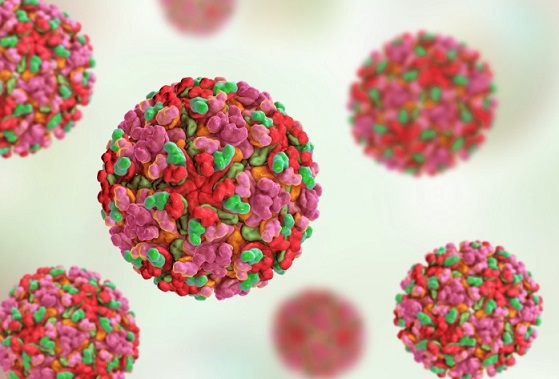Nikhil Prasad Fact checked by:Thailand Medical News Team Jan 31, 2025 10 months, 3 weeks, 6 days, 5 hours, 2 minutes ago
Medical News: Chikungunya virus (CHIKV) is an infectious pathogen that has been spreading across the world since its discovery in 1952 in Tanzania. It is transmitted by mosquitoes and is known to cause high fever, skin rash, and severe joint pain, which can last for years in some cases. While the virus is rarely fatal for healthy adults, it poses a serious risk for infants, the elderly, and those with weak immune systems. Over time, CHIKV has adapted to new mosquito species, making it a growing global health concern.
 UK Study Finds That Chikungunya Virus nsP3 Protein Blocks Key Immune Pathway
UK Study Finds That Chikungunya Virus nsP3 Protein Blocks Key Immune Pathway
A recent study conducted by researchers from the University of Leeds, United Kingdom sheds light on a previously unknown way in which CHIKV manipulates the human immune system. Their findings could lead to new strategies for treating or preventing chikungunya virus infections. This
Medical News report explores their discoveries in detail.
How CHIKV Disrupts the Immune System
Our bodies rely on immune responses to fight infections, and a key player in this defense system is a pathway called NF-κB. When activated, NF-κB helps cells produce molecules that signal the immune system to attack infections. Many viruses try to block this pathway to escape detection, allowing them to multiply more easily. The new research reveals that CHIKV achieves this by using a specific protein, known as nsP3, to suppress NF-κB activation.
NsP3 is a non-structural protein that plays multiple roles in the chikungunya virus life cycle. It consists of three main parts, one of which is called the macro domain. Scientists found that this macro domain has the ability to interact with a small molecule called ADP-ribose, which plays an essential role in various cellular functions, including immune responses. The research team discovered that the nsP3 protein prevents NF-κB from doing its job by interfering with how ADP-ribose affects immune signaling.
Key Findings from the Study
The study was performed using human lung cells (A549 cells) infected with CHIKV. The scientists compared the behavior of infected cells to those exposed to tumor necrosis factor-alpha (TNF-α), a chemical that is known to strongly activate the NF-κB pathway. Their key findings include:
-CHIKV infection did not activate NF-κB: Normally, when a virus infects human cells, NF-κB is triggered to fight the infection. However, when the researchers infected the cells with CHIKV, they found that the NF-κB pathway remained inactive, suggesting the virus was blocking it.
-CHIKV did not prevent external NF-κB activation: While the virus itself did not trigger NF-κB, it also did not stop TNF-α from activating the immune pathway. This indicates that the virus uses a more selective approach to interfere with immune signaling.
-Expression of the nsP3 protein alone was en
ough to block NF-κB activation: Even when tested separately, nsP3 could suppress NF-κB, confirming that this viral protein was responsible for interfering with the immune response.
-Mutation in the macro domain of nsP3 removed its ability to block NF-κB: The researchers introduced a mutation called D10A in the macro domain of nsP3. This altered version of the protein could no longer suppress the NF-κB pathway, proving that the macro domain is essential for this function.
-The D10A mutation weakened the virus in human cells but not in certain mosquito cells: The mutated virus, which could no longer block NF-κB, struggled to replicate in human cells. However, it still grew in a specific mosquito cell line (C6/36), suggesting that nsP3 plays a different role in insect cells.
Why This Discovery Matters
Understanding how viruses suppress immune pathways is critical for developing effective treatments. CHIKV infections often lead to chronic joint pain, and immune system interactions may play a role in this long-term damage. By targeting the nsP3 protein, scientists might be able to develop drugs that restore the NF-κB pathway, making it harder for CHIKV to survive in human cells.
Additionally, this discovery raises new questions about how other viruses use similar strategies. Many viruses, including coronaviruses and flaviviruses (such as dengue and Zika), contain macro domains. It is possible that these viruses also manipulate the immune system in comparable ways. If so, drugs designed to block nsP3’s function might be useful against multiple viruses.
Future Research and Potential Treatments
The findings open up several promising directions for future research. Scientists need to explore whether small-molecule inhibitors could be designed to block nsP3’s macro domain activity. Such drugs might prevent CHIKV from disabling the immune response, allowing the body to clear the virus more effectively.
Moreover, further studies should investigate whether other proteins within CHIKV or related viruses contribute to immune suppression. The chikungunya virus is known to cause long-term inflammatory conditions, and its ability to suppress immune pathways may play a role in these chronic effects.
Conclusions
This study highlights how the chikungunya virus uses its nsP3 protein to manipulate the immune system by blocking the NF-κB pathway. The macro domain of nsP3 plays a crucial role in this process, as a mutation in this region weakened the virus in human cells. These findings pave the way for new antiviral strategies that could restore immune function and help fight CHIKV infections.
The discovery also suggests that other viruses with macro domains may use similar tactics to avoid immune detection. Future research may reveal new antiviral treatments that could be effective against multiple types of viruses beyond CHIKV. Given the global impact of chikungunya virus and its potential to cause long-term health problems, these findings could play a crucial role in developing future therapies.
The study findings were published in the peer-reviewed journal: Viruses.
https://www.mdpi.com/1999-4915/17/2/191
For the latest on the Chikungunya Virus, keep on logging to Thailand
Medical News.
Read Also:
https://www.thailandmedical.news/news/silico-study-reveals-potential-antiviral-properties-of-nyctanthes-arbor-tristis-linn-against-ebola-sars2-nipah-chikungunya-viruses
https://www.thailandmedical.news/news/papaya-leaves-extract-and-fruit-pulp-emerging-as-a-broad-spectrum-antiviral
